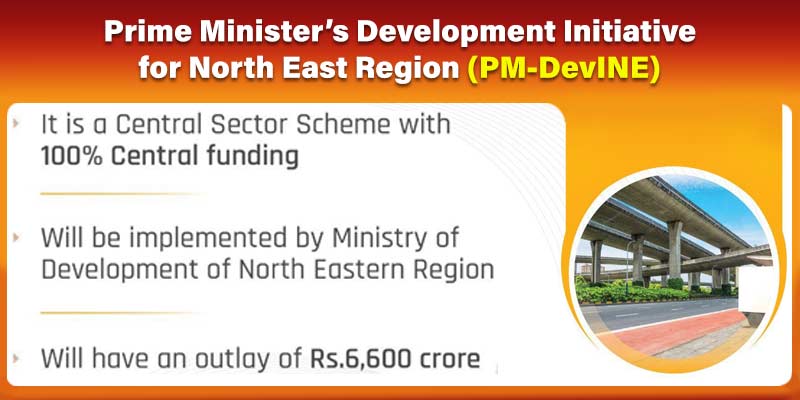- India
- Oct 13
Explainer / What is PM-DevINE?
Prime Minister’s Development Initiative for North East Region (PM-DevINE), a Rs 6,600 crore scheme to support infrastructure, industries and other livelihood projects in the northeastern states, was approved by the Union Cabinet, chaired by Prime Minister Narendra Modi.
The new scheme, to be implemented during the remaining four years of the 15th Finance Commission from 2022-23 to 2025-26, is a 100 per cent central government-funded plan and will be administered by the ministry of development of north eastern region (DoNER).
Significance of the new scheme
• There are other ministry of DoNER schemes for the development of the northeast region. The average size of projects under other ministry of DoNER schemes is about Rs 12 crore only.
• The parameters of northeast states in respect of Basic Minimum Services (BMS) are well below the national average and there are critical development gaps as per the District Sustainable Development Goal (SDG) Index 2021-22 prepared by NITI Aayog, UNDP and the ministry of DoNER. The new scheme was announced to address these BMS shortfalls and development gaps.
• It will provide support to infrastructure and social development projects which may be larger in size and will also provide an end-to-end development solution instead of isolated projects.
• It will be ensured that there is no duplication of project support under the PM-DevINE with any of the other schemes of the DoNER ministry or those of any other ministry and department.
• The PM-DevINE is in addition to the quantum of resources available for the development of the northeast region. It will not be a substitute for existing central and state schemes.
The objectives of the PM-DevINE are to:
• Fund infrastructure convergently, in the spirit of PM Gati Shakti.
• Support social development projects based on the needs of the northeast region.
• Enable livelihood activities for youth and women.
• Fill the development gaps in various sectors.
Implementation of the scheme
• The scheme will be implemented by the DoNER ministry through the North Eastern Council (NEC) or central ministries or agencies.
• Efforts will be made to complete the PM-DevINE projects by 2025-26 so that there are no committed liabilities beyond this year and this implies front-loading of the sanctions under the scheme in 2022-23 and 2023-24 primarily.
• While expenditure would continue to be incurred during 2024-25 and 2025-26, focused attention will be given to completing the sanctioned PM-DevINE projects.
• The scheme will lead to the creation of infrastructure, support industries, social development projects and create livelihood activities for youth and women, thus leading to employment generation.
• Measures would be taken to ensure adequate operation and maintenance of the projects sanctioned under the PM-DevINE so that they are sustainable.
• To limit construction risks of time and cost overrun, falling on the government projects would be implemented on an engineering-procurement-construction (EPC) basis, to the extent possible.
• While some of the projects to be approved for 2022-23 under the PM-DevINE are part of the budget announcement, projects with substantial socio-economic impact of sustainable livelihood opportunities for the general public (for example basic infrastructure in all primary health care centres, comprehensive facilities in government primary and secondary schools, etc) may be considered in the future.
Manorama Yearbook app is now available on Google Play Store and iOS App Store

